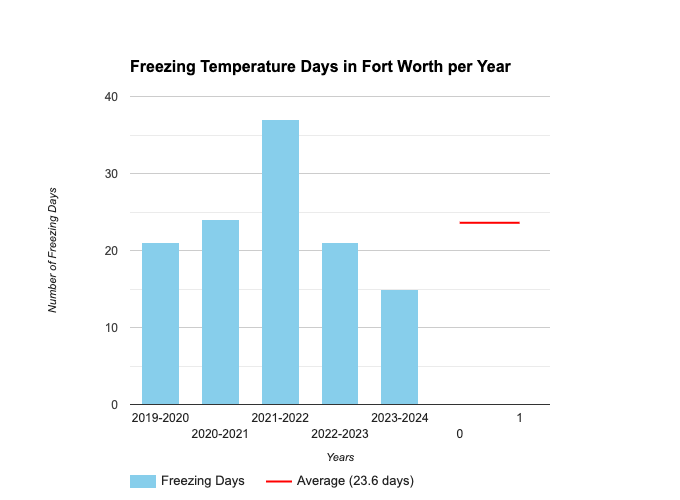This article will outline the frequency of frozen pipes in Fort Worth, TX, over the past 5 years.
According to weather.gov, Fort Worth has averaged 23.6 “freezing” days yearly since 2019-2020.
In Fort Worth, weather conditions conducive to freezing pipes occur on 6.47% of the days each year.
| Year | Freezes | % of Freezes Per Year |
|---|---|---|
| 2023-2024 | 15 | 4.11% |
| 2022-2023 | 21 | 5.75% |
| 2021-2022 | 37 | 10.14% |
| 2020-2021 | 24 | 6.58% |
| 2019-2020 | 21 | 5.75% |
| Average: | 23.6 | 6.47% |

Notice: Just because the conditions for frozen pipes exist does NOT mean your pipes will freeze or burst during those periods.
Coldest Months in Fort Worth for Frozen Pipes
According to weather.gov, January, February, and December are the three coldest months in Fort Worth, creating the greatest risk of frozen pipes.
| Year | Jan | Feb | Mar | Apr | May | Jun | Jul | Aug | Sep | Oct | Nov | Dec | Total |
|---|---|---|---|---|---|---|---|---|---|---|---|---|---|
| 2024 | 43 | 57.7 | 61.8 | 68.7 | |||||||||
| 2023 | 52.1 | 52.4 | 60.7 | 65.3 | 75.6 | 84 | 89.3 | 92.9 | 84.6 | 69.2 | 57.8 | 52.8 | 69.7 |
| 2022 | 45.8 | 46.2 | 58.5 | 69.5 | 77.9 | 86.1 | 91.8 | 86.8 | 80.6 | 69.1 | 55 | 50.7 | 68.2 |
| 2021 | 47.5 | 41.1 | 61.4 | 64.6 | 71.8 | 82.1 | 84.7 | 85.1 | 80.5 | 72 | 57.7 | 61.3 | 67.5 |
| 2020 | 50.3 | 49.6 | 63.4 | 64.6 | 73.8 | 81.9 | 85.7 | 86 | 74.7 | 65 | 60.4 | 49 | 67 |
| AVG | 47.74 | 49.4 | 61.16 | 66.54 | 74.77 | 83.52 | 87.87 | 87.7 | 80.1 | 68.82 | 57.72 | 53.45 | 68.1 |
Frozen Pipe Damage Cost By State
According to Statefarm, Texas tops the list of frozen pipe damage costs by State, which might surprise some who view it as a warm climate.
It is actually the State’s warm climate that leads to its high frozen pipe damage expenses because pipes are often left uninsulated, especially in addicts and crawl spaces.
A mere one-eight-inch crack in a pipe can leak 250 gallons of water daily. This damages household valuables, including furniture, carpeting, and personal possessions.
Check out the data below:
| State | Cost |
|---|---|
| Texas | $64 million |
| New York | $17 million |
| Illinois | $10.8 million |
| Michigan | $7.2 million |
| Colorado | $6.5 million |
| Washington | $6.4 million |
| Minnesota | $6.3 million |
| Pennsylvania | $5.7 million |
| Alaska | $4.3 million |
| Connecticut | $3.8 million |
Locating a Frozen Pipe
Although severe winter freezes are less frequent in Fort Worth, they happen. Here is how you find a frozen pipe before it bursts.
- Feel Your Pipes: Sections that feel colder than others might be frozen
- Monitor Water: A pipe with no water flowing can be an indicator of a freeze
If you locate a possible frozen pipe, acting quickly is crucial. Contact Cowtown Plumbers for help.
How Long Do Pipes Stay Frozen?
A frozen pipe can take hours or days to thaw; by this point, it may burst, resulting in expensive water damage to your Fort Worth home or property.
Because frozen pipes occur during winter, waiting for warmer weather is too risky.
Can Frozen Pipes Cause Low Water Pressure?
Frozen pipes can cause low water pressure because frozen water expands within the pipes, impeding the water flow. In severe cases, water may stop flowing entirely.
Whether you notice low water pressure or a lack of water flow, your pipes are at risk of bursting, which results in a plumbing emergency.
Preventing Frozen Pipe Bursts in Fort Worth
During freezing temperatures, Fort Worth homeowners can take the following steps to reduce the risk of a frozen pipe burst:
- Dripping Faucets: Keep all your faucets dripping (both cold and hot) until the temperature rises above 20 degrees Fahrenheit
- Outdoor Pipe Insulation: Insulate outdoor pipes with foam or other material
- Hose Disconnect: Disconnect hoses from outdoor pipes
- Faucet Washers: Ensure the security of outdoor faucet washers
- Meter Box: Ensure the lid remains on your meter box
- Cabinet Doors: Keep all of your cabinet doors open
- Thermostats: Set the temperature at 70 degrees or above
If you have access to plumbing services in Fort Worth, TX, like those from Cowtown Plumbers, shutting off the water valve until plumbers arrive makes sense. If you are sure your pipes have burst, turning off your water immediately is vital.
For more information on preventing frozen pipes, visit fortworth.gov.
Conclusion
Frozen pipes are less frequent in Fort Worth than in other parts of the United States. However, they still happen. Fort Worth averages 23.6 freezing days yearly, giving homeowners 6.47% of days per year when frozen pipes can occur.
Unfortunately, the damage caused by frozen pipes in Texas is more significant than in other U.S. States. The primary reason for this is that the warm climate of Texas leaves uninsulated pipes more vulnerable to cold temperature shifts.
Of course, not all freezing conditions will automatically result in frozen or burst pipes. To reduce your risks, you can take preventive measures like dripping your faucets and keeping your thermostat at 70 or above.
If you notice low water pressure or a lack of water flow, your pipes will likely burst. In this case, you are facing a plumbing emergency and should contact a professional plumbing service like Cowtown Plumbers.


